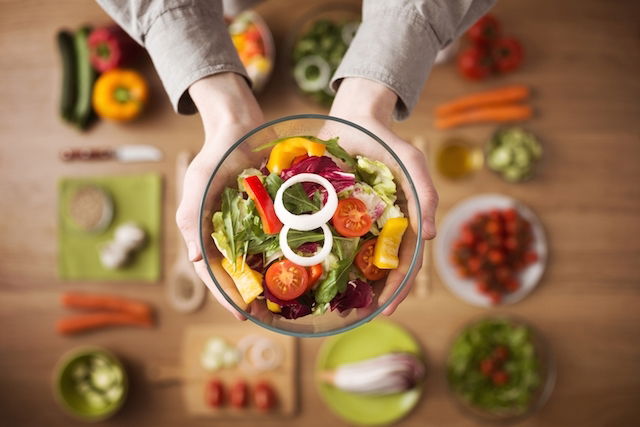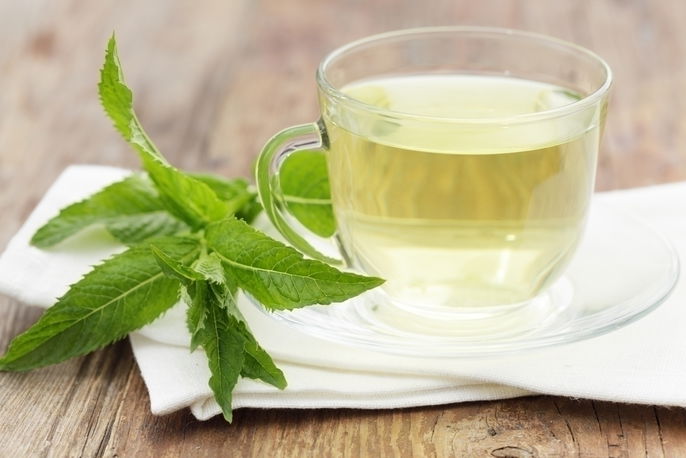A liver detox is aimed at eliminating toxins in the body through urine, stool or sweat. Many times, a cleanse is done after prolonged use of a certain medication or after many days of over-eating. Detoxes can also help to prevent or treat health problems like dysbacteriosis, type 2 diabetes, auoimmune disease, fibromyalgia, fatigue and allergies.
To detox your liver, it is important to maintain a diet that is rich in fruits and vegetables. Some teas can also help with the process, like green tea and boldo tea. You should also remove processed food from your diet, as well as refined sugar, and ensure adequate fluid intake.
However, it is important to note that there is no evidence supporting the possible benefits of a liver detox diet. The body detoxes naturally through specific organs, and can be promoted with the help of habits, such as eating a healthy diet, exercising, and getting a good night's sleep.

The main ways to detox a liver are:
1. Eat detox food
Food that detoxes the liver help to eliminate free radicals and metals like mercury in the body, which can be toxic.
Some foods that you can add to your daily diet are:
Propolis
Propolis is a good that is produced by bees. There are different types available, but red-tinged propolis especially has a high quantity of flavonoids. Flavonoids are compounds that contain anti-inflammatory and antioxidant properties that help with digestion and contribute to liver detoxing. It should be consumed in its pure form - 30 drops can be added to your tea or water once per day.
Ginger
Ginger is a type of root used in liver detox diets due to its high quantities of anti-inflammatory and antioxidant substances. These help with digestion and help with cleansing the body. Ginger can also protect the liver from damage caused by long-term medication use. Ginger can be used in tea or in smoothies, salads or sauces.
Vegetables
Vegetables like broccoli, brussel sprouts, carrots, garlic, peppers, cauliflower and leafy greens like spinach are high in vitamin c, betacarotenes, fiber and water. These nutrients contain anti-inflammatory and antioxidant functions. During a liver detox diet, you should aim for 8 to 10 portions of vegetables per day to help eliminate toxins from the body.
Vegetables used in this diet should be seasonally available, and can be used in salads, soups or stir-frys. Beets are a beneficial food choice, as they contain betaine, a nutrient that helps to cleanse the liver. It should be consumed with protein, like eggs or tofu, or with natural fats, like olive oil, to avoid high rises in blood sugar levels.
Protein
Protein is essential for a liver detox diet as it helps to sweep away toxins from the body. Protein can also help to control hunger, which can prevent indulgent over-eating of unhealthy food.
Vegetarians can opt for plant-based protein, like tofu, tempeh and miso. Animal-based protein should come from lean meats like chicken, and eggs. Fish should have low amounts of mercury, which is a metal that can be very toxic for the liver. Examples include hake, mullet, wild salmon, tilapia, trout, and sea bass.
Check out our list of high-protein foods that you can add to your diet.
Legumes
Beans, lentils and chickpeas are legumes that are a great source of protein, which also help to sweep-away toxins in the intestines. Soybeans are rich in isoflavones, which are antioxidant compounds that help to excrete toxins through the stool. In a liver detox diet, legumes should be eaten at least once a day, in salads or soups for example.
Fruit
Apples, lemons, cashews, oranges, tangerines, pineapple, pomegranate, grapes, strawberries, blackberries, blueberries and cherries are examples of fruits that should be consumed when detoxing the liver. These fruits are rich in vitamin C, malic acid and fiber, which are nutrients that contain anti-inflammatory and antioxidant properties that help to remove toxins from the body.
Fruit should be fresh and eaten with the peel on a daily basis. However, they should be consumed with a protein source, like fish, miso or natural fat (like coconut oil) to prevent a high rise in blood sugar levels.
Natural oils and fats
Olives, avocado, coconut, coconut oil, extra virgin olive oil and flaxseed oil are some examples of healthy fats, These contain anti-inflammatory and antioxidant functions that are important for a liver detox diet.
Natural oils and fats should be eaten on a daily basis in moderation, and can be used as a way to season salads. Avocado and coconuts, for example, can be used in desserts, salads or as snacks.
Seeds and nuts
Seeds like pumpkin seeds, chia seeds, or sesame seeds, as well as nuts, like walnuts, peanuts, cashews, and Brazil nuts, contain a combination of nutrients that can help promote liver health by reducing liver workload. They protect liver cells from oxidative damage, and can support proper metabolic function.
2. Drink detox juices
Detox drinks, like cabbage or beat juice, are a great way to increase your fruit and vegetable intake. These are rich in water, vitamins, minerals and antioxidants that helps with liver detoxing. These juices help with to treat bloating or swelling water retention, and they contain little fat and calories, making them a great option for weight loss or maintenance.
Detox drinks should be used as a complement to liver detox diets. Ideally, you should consume one per day and aim to rotate the fruits and vegetables used to diversify your intake of nutrients like vitamin C, vitamin B complexes, zinc and magnesium. Check out these delicious detox drink recipes.
3. Drink detox teas

Detox teas are rich in phytochemicals and antioxidants that improve blood circulation, which makes them a great complement to a liver detox diet. You are advised to drink 1 to 3 cups of tea per da after meals to help with digestion.
Some teas that can help to cleanse the liver are:
- Boldo tea: Boldo is a medicinal plant that contains flavonoids and polyphenols, which are anti-inflammatory and antioxidant properties that are important for a liver detox diet. These can help to stimulate normal liver function. Boldo tea should not be consumed by people with liver disease (like hepatitis or cancer) or during pregnancy.
- Green tea: Green tea contains catechines, which are compounds with antioxidant and anti-inflammatory action, which are important for detoxing the liver. Studies show that green tea can help to reduce accumulated body fat, which is common in fatty liver. It should not be consumed by children, or pregnant or breastfeeding women, and is contraindicated in people with kidney problems, insomnia, gastric ulcers, anemia or gastritis.
- Artichoke tea: Artichoke leaves are rich in antioxidants that help to eliminate fat and stimulate the growth of healthy liver cells. This can lead to optimal digestion and prevention of liver conditions, like fatty liver. Artichoke tea is not indicated for children, or pregnant or breastfeeding women, and is contraindicated in people with gallbladder obstructions or serious liver issues.
- Mint tea: Mint teas can be beneficial during a liver detox diet, as it stimulates the production of bile. Bile is one of many compounds that help with digestion, and it promotes good lover function. Mint tea is not indicated for children, or pregnant or breastfeeding women, and is contraindicated in people with gallbladder stones or serious liver issues.
4. Drink water everyday
Water helps to eliminate toxins from the body. You should drink about 150 ml (or 5 oz) of water for every 4.5 kg (or 10 lb) od body weight every day. This means that a person who weighs 55 kg (about 120lb) should drink around 1.8 L (or 60 oz) of water per day.
Water should be filtered and should not be stored in a plastic bottle, as this material can contain toxic compounds like bisphenol A, which is released when plastic breaks down. These toxins can impede with normal hormonal function, which will affect liver detoxing.
5. Exercise regularly
Exercising regularly can help to balance your hormones, which stimulates a natural antioxidant response in the body. It helps to improve metabolism, which can contribute to liver detoxing.
You are advised to perform aerobic exercise twice a week for 75 to 150 minutes at a high intensity (e.g. playing basketball or running). You can also opt for 150 to 100 minutes of aerobic exercise twice a week at a medium intensity (like a brisk walk or light biking). Ensure you also engage strength training by incorporating chest exercises or leg exercises into your weekly routine.
6. Sleep 7 to 9 hours per day
Having adequate sleep with 7 to 9 hours at night can help prevent illnesses and regulate your metabolism, which will help to eliminate toxins in the body. Sleeping is an instinctual habit that helps with liver detoxing. Check out our tips on how to fall asleep faster to help you get a good night’s rest.
7. Avoid inflammatory food
In addition to maintaining a balanced diet with fruit, vegetables and protein as well as propolis, teas, ginger and detox drinks, you should also avoid food that causes bodily inflammation, like:
- Alcoholic drinks, as they can overload the liver
- Processed meat, like prosciutto, turkey cold cuts, bacon, sausage, salami and mortadella
- Fried and fatty foods, like chips, margarine and chicken skin
- Dressing and ready-made sauces, like premade spice cubes, shoyu sauce, salad dressing.
- Food with toxic metals, like shrimp, mackerel, bass, and tuna, as these naturally contain high amounts of mercury
- Milk and dairy products, like cheese and yogurt, which can contain hormones and antibiotics. These can also cause allergies and bacterial imbalances.
- Gluten, from breads and wheat pasta which can cause allergies and intolerances, and lead to bacterial imbalances.
- Sweets and refined sugar, as these foods can cause inflammation and impede liver detoxing.
- Processed foods, which normally contain chemical additives which can harm the liver.
In addition, it is important to use medications that are not prescribed by the doctor. Many medications are metabolized by the liver, which can make detoxing more difficult. You should also quick smoking, as toxins found in cigarettes can interrupt normal liver function. Learn more about the symptoms associated with liver disease.
While detoxing, your calorie intake should not be limited, as your body requires energy to remove toxins. However, in cases of obesity, a doctor and registered dietitian may incorporate a low-calorie, weight loss plan into the detox diet. Learn more about an anti-inflammatory diet and check out our sample meal plan if you are stuck on how to organize your food intake.
Liver detox meal plan
The following table outlines an example of what you can eat for 3 days while detoxing your liver.
This menu is just an example of what you can include in your diet while detoxing your liver. Seeing a registered dietitian is vital to create a meal plan that is personalized to your needs, health goals and preferences.
When maintaining a liver detox diet, calorie intake from food should not be limited, as the body needs energy to eliminate toxins.
However, in some cases, such as overweight or obesity, your doctor and registered dietitian may recommend a reduced-calorie diet as well.






























